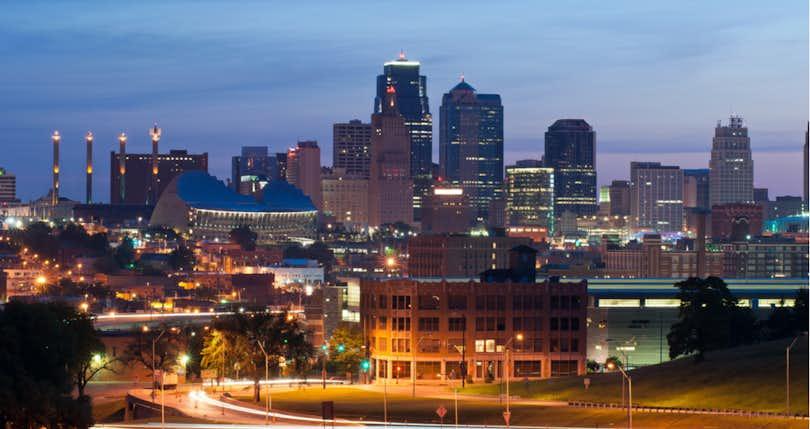First-time buyers in Kansas might not be aware of all the fees that are included in buying a house. We’ve made it easy for you and listed the costs you should expect to see when finalizing the purchase of your Kansas house. Keep reading to learn about the anticipated fees that come with home buying.

So, you’ve found your dream home and are approaching your closing day with some anticipation. This is a very exciting time but you want to make sure you are well prepared for closing day.
On your closing day, you will most likely be paying some fees, such as your down payment. However, you are also in charge of paying your closing costs. Aside from the actual price of your home and your down payment, closing costs are one of the more expensive things buyers are required to pay. We recommend that all buyers do their homework and work with an experienced, local real estate agent in order to be prepared before pulling the trigger on a home purchase.
Want to connect with a top-rated, Kansas buyer’s agent? Clever can help! Fill out our online form and we’ll be in touch to answer any questions you might have and introduce you to one of our local Partner Agents for a no-obligation consultation.
Closing Costs for Kansas Homes: What to Expect
According to data from Bankrate, average closing costs in the state of Kansas are $1,957, including origination and third-party fees. Keep in mind that this study does not account for a number of variable costs, such as title insurance, title search, taxes, other government fees, escrow fees, and discount points — which means you should expect even more costs down the road.
Typically, buyers will be paying anywhere from 2-5% of the total price of the house. In Kansas, the median home value is $185,000, so you can expect to pay anywhere from $3,700 and $9,250.
While closing costs can be expensive, one of the largest mortgage expenses is the interest rate. Over the life of the loan, a few small percentage points can result in hundreds of thousands of dollars in interest payments.
One of the best ways to lower your interest rate? Shop around and compare lenders! Fill out the form below for a quote from a licensed, local lender – even if you’re pre-approved it pays to compare.
Common Closing Costs for Kansas Home Buyers
There are a few different types of closing costs that you’ll be paying when you buy your house. In order to get you familiar with them, we have outlined what expenses you should expect to pay for.
Loan Origination Fees
Loan origination fees are the charges associated with the creation of a new loan. These loan origination fees are typically 1% of the cost of the mortgage amount and are paid to the bank or lender. These fees can be negotiated depending on the risk factor of the loan and if the borrower is credible.
Title Insurance
Title insurance is a type of insurance offered by title companies that insures against losses resulting from defects in the title, such as liens, outstanding taxes, mortgages and violations belonging to previous owners.
A title search is used to make sure that the property is free and clear of any and all obligations. It also ensures that no party has a claim on the house because of unpaid dues, legal suits, and other factors. Title insurance can be up to $320 and a title search can range from $40 to $275.
Discount Points
Discount points are a type of prepaid interest that can be bought upfront to reduce the interest rate charged by the bank. These fees are negotiable and may be covered by the bank.
Prepaid Costs
When a buyer gets their loan, the lender might require them to pay costs like property taxes and homeowners insurance in advance. The lender will list these costs in an estimate of closing costs called The Good Faith Estimate. This is given to the buyer no more than three days after applying for a loan.
Appraisal Fees
Appraisal fees associated with the cost for a professional appraiser to come out and assess the home's value. They are typically required by lenders and can range anywhere from $300 to $500 depending on some property characteristics like size, location, and property type. Even if the lender doesn’t require it, it’s recommended to have one done so you know the fair market value and don’t end up overpaying for a house.
Recording Fees
Recording fees are also known as transfer taxes and these prices vary by state. Some states don’t have them, but most of them do. In Kansas, the transfer tax rate is $0.26 per $100 of the mortgage cost.
Survey Fee
The survey fee pays for a surveyor to come out and show the exact boundary, location, and legal description. This fee ranges anywhere from $208 and $782, but the average cost in Kansas is $495. The amount you’ll spend depends on the property size and location.
Credit Report Fee
When your lender pulls your credit to get you qualified for a loan, this cost is typically around $50 to $60.
Other Costs to Consider
It might come as a surprise that there are still more costs that you’ll need to know about. However, it’s really in the buyer’s best interest to completely understand all the financial implications that come with buying a new house before it’s too late.
Homeowners insurance
Homeowners insurance is vital for homeowners to have because it covers possible damage to your home. Your first year’s insurance is often paid at closing. Kansas annual premiums for homeowners insurance are around $1,431, which is only $300 more than the United States national average. How much you will have to pay can vary a lot depending on your home’s size, your assets, and your home address.
Property Taxes
Property taxes are a large source of funding for the city, county, and state governments. The taxes are determined upon a percentage of the assessed value of the property. Property taxes are frequently negotiated because of the different boards, councils, and legislatures meet to decide the appropriate rates.
Kansas effective property tax rate costs the typical homeowner about $1,890 a year, which is fairly high compared to the national average. This is important to consider when choosing to buy a home because that cost can come out to a whopping $157 a month, just in property taxes.
Utilities and Maintenance Costs
Despite having high property taxes and homeowners insurance premiums, the basic cost of living and utilities are fairly low in Kansas. They frequently rank below the national average in terms of utility costs.
We don’t think it can be stressed enough that as a potential homeowner, you need to completely understand every financial responsibility that comes with owning a home. Knowing what costs are coming around the bend should help give you an idea of how much you’ll need to set aside for closing costs.
How to Save on Closing Costs in Kansas When Buying a Home
There are a few ways that you can save on closing costs when buying a home. Something to consider is possibly taking advantage of closing cost assistance programs. In Kansas, you have several options you may be eligible for.
KHRC First Time Home Buyer Program
The Kansas Housing Resources Corporation (KHRC) offers potential home buyers assistance via the First Time Homebuyer Program. Eligible applicants can receive assistance funds between 15-20% of the total purchase price, depending on their income bracket.
Kansas Housing Assistant Program
The Kansas Housing Assistant Program provides assistance to eligible potential home buyers that have a 30-year fixed rate mortgage loan. They can receive up to a 5% grant for cash assistance for down payment or closing costs.
United States Department of Housing and Urban Development
The HUD has various state-wide and regional programs for residents in Kansas that qualify for assistance. Some of them are Habitat for Humanity, State of Kansas first time home buyers program, and U.S. Department of Agriculture Rural Housing.
Additionally, you can save even further on closing costs by negotiating with sellers. An experienced real estate agent will be able to assist in this process and can work to get you a more manageable fee when it comes time to close on your new home. Having an agent with negotiating skills can save you a lot of money during the buying process.



